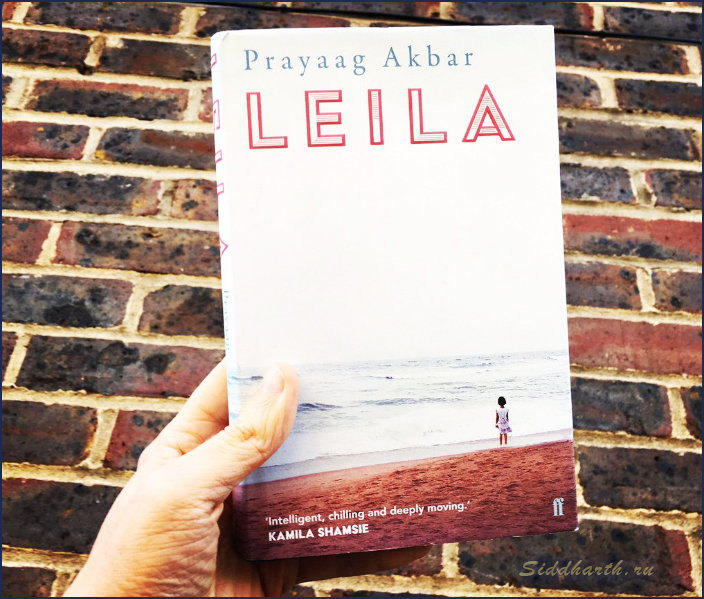Выдержки из отзыва Эрика Карла Андерсона о романе Праяга Акбара «Лейла»
19.12.2018
lonesomereader.com, Twitter, 12-13 декабря 2018 г.

Выдержки из отзыва Эрика Карла Андерсона о романе Праяга Акбара «Лейла»
Сюжет сериала основан на одноименном романе 2017-го года Праяга Акбара «Лейла».
В романе прямо и открыто рассматриваются проблемы кастовой системы Индии, которая имеет такую масштабную, сложную историю и по сей день продолжает вызывать ужасающие случаи насилия... Роман доводит разделение между кастами до крайности, где возводятся физические стены, чтобы отделить сообщества друг от друга, находить ресурсы для членов «элитных» каст и стремиться к «чистоте» расы и социального статуса.
Недалекое будущее, антиутопия, Шалини теряет во время ареста свою трехлетнюю дочь Лейлу. В течение многих лет мать тайно замышляла, как снова найти свою дочь среди агрессивно консервативной и строгой системы. Спустя 16 лет, наконец, ее план может быть осуществлен.
И, хотя Шалини - персонаж, вызывающий большую симпатию, постепенно становится очевидным, что у нее есть свои предрассудки и заблуждения о страданиях членов разных каст. В то же время она обычная женщина, чья главная забота о благополучии ее дочери. После некоторых перемен в обществе Шалини вынуждена задуматься о том, какие психические стены она сама поддерживала против других.
Oxy для siddharth.ru
Рахул Кханна и Сима Бисвас также в команде сериала «Лейла»
Дипа Мехта прокомментировала ретвитнула твит Эрика Карла Андерсона.
@IamDeepaMehta, 13.12.2018:
- I second that ! As does @NetflixIndia whose new series is based on @unessentialist book Leila. Starring the indomitable @humasqureshi @Actor_Siddharth Rahul Khanna and the brilliant Seema Biswas.
- Поддерживаю это! Как и @NetflixIndia, чей новый сериал основан на книге Праяга Акбара (@unessentialist) Leila. В главных ролях неукротимая Хума Куреши (@humasqureshi), Сиддхарт (@Actor_Siddharth), Рахул Кханна и блестящая Сима Бисвас.
@lonesomereader (Eric Karl Anderson), 12.12.2018:
- Debut novelist Prayaag Akbar’s dystopian vision of an India divided by caste is really striking: http://lonesomereader.com/blog/2018/12/12/leila-by-prayaag-akbar
Антиутопическое видение дебютного романиста Праяага Акбара об Индии, разделенной по кастам, действительно поразительно: ссылка на отзыв о романе
Перевод: Oxy для siddharth.ru
Leila by Prayaag Akbar
There’s been a notably high number of dystopian novels being published in recent years and it feels like this reflects a widespread anxiety. Novels such as “Station Eleven”, “The Country of Ice Cream Star”, “The Power” and “Hazards of Time Travel” have all taken very different approaches to creating scarily convincing counter-realities to our present landscape, especially in regards to misogynistic attitudes towards women. It’s always interesting to see how new dystopian fiction tries to create an urgent, radical dialogue with society today. The presumption being: if we don’t pay attention to what’s happening around us this nightmarish landscape might come sooner than we think. In the case of “The Handmaid’s Tale”, Atwood has famously said the novel contains nothing which hasn’t already happened in the world.
Prayaag Akbar’s debut novel “Leila” deals directly with issues of the caste system in India which has such a far-reaching, complex history and continues to incite horrific instances of violence. The novel takes the divisions between castes to the extreme where physical walls are erected to separate communities from each other, shore in resources for members of “elite” castes and strive towards a “purity” of race and social status. This is filtered through the perspective of Shalini who mourns the disappearance of her daughter Leila when she was suddenly lost after Shalini was seized and taken to a government-sanctioned reform camp. For years she’s secretly schemed how to find her daughter again amidst an aggressively conservative and strict system. Finally her plans might be carried out. We follow her journey as she puts her plot into action and recalls the horrific events which led to this dire situation.
I feel like some of the references in the novel were definitely lost on me because I have such a slim understanding of how the caste system works in India. There’s such a profusion of subcastes and subtleties to the way religion and social status play into how classifications of caste dictate the position of individuals in society that I sometimes felt disorientated and confused. I don’t think that mattered though because what carried me through the story was Shalini’s plight, the urgent concerns of motherhood and the egregious violence inflicted upon her mind and body. I felt the impact of her struggle and Akbar renders scenes of trauma with skilled clarity. Shalini was living quite a comfortable existence in a liberal lifestyle though she was aware that regressive attitudes and mob-like violence inflicted by a puritanical group called the Repeaters were increasing. But all this felt quite removed from her life until it reaches her doorstep and when it does it’s really effective.
What’s particularly interesting about Akbar’s narrative is that, though Shalini is a very sympathetic character, it gradually becomes apparent that she has her own prejudices and ignorance about the suffering of members of different castes. At the same time, she’s just an ordinary woman whose primary concern is for the welfare of her daughter. But, when the political landscape changes and a woman named Sapna who used to be Shalini’s nanny has acquired a very different social position, Shalini is forced to consider what mental walls she maintained against others. While this shift might feel overstated at points, it’s nonetheless effective in creating a multifaceted story which is as riveting in its mystery as it is in prompting readers to consider how we might all possess forms of blindness to the suffering of people who are different from us. Akbar’s writing also has a beautiful fluidity which is a pleasure to read. He formerly worked as a journalist and it’s striking how his concern for investigating social issues has now translated into fiction.
12.12.2018
Eric Karl Anderson, lonesomereader.com


Комментарии